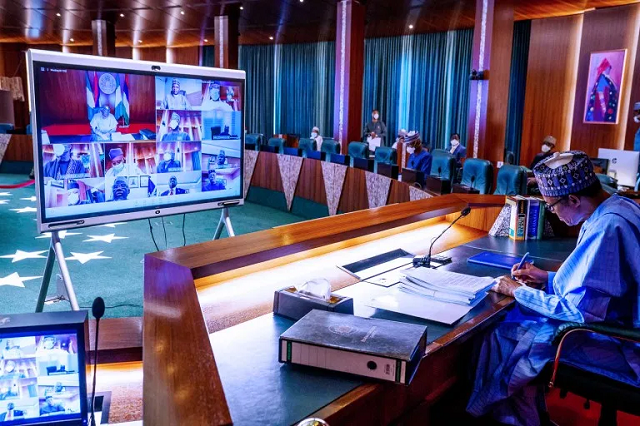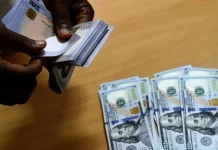The Federal Executive Council (FEC) has approved the 2021-2023 Medium Term Expenditure Framework and Fiscal Strategy Paper (MTEF/FSP) with N12.66 trillion budget projections for each of the three fiscal years.
Briefing State House Correspondents at the end of the eight FEC meeting presided over by President Muhammadu Buhari, the Minister of State for Budget and National Planning, Mr Clement Agba, listed other projections in the budget as $40 per barrel oil benchmark, the oil production volume of 1.6 million barrels per day, the inflation rate of 11.9 per cent, projected gross domestic growth rate of 3 percent and revenue target of N7.50 trillion.
Agba, who also spoke on the country’s GDP projection at the end of 2020 fiscal year, disclosed that at the end of 2020, GDP projection is expected to cruise at -4.42 percent and later improve to about -1.8 percent later.
He said whereas the revenue target for 2020 budget is N5.84 trillion, it is projected to rise to N7.50 trillion in 2021, explaining that “even though the projected oil production volume is lower when compared to the earlier projection in 2020 budget as a result of the Organisation of Petroleum Export Countries (OPEC) restriction quota, 63 Government Owned Enterprises (GOEs) have been brought in to get prices at par.”
According to him, the GOEs have been drafted to raise another N2.17 trillion to fund the budget, adding that despite the N7.50 trillion budget projections for 2021 and the projected additional N2.17 trillion to be driven by the GOEs, the figures would eventually match the N12.66 trillion budget projections.
“On projected revenue for 2021, yes, I spoke of the various assumptions that have been made in terms of parameters, and those assumptions are what drive revenues that we get and in terms of how you are able to reflate the economy and spend helps your GDP.
“For Nigeria, it was projected that by the end of this year we should have the GDP top at -4.42 percent. However, with the stimulus, if properly done and executed, we expect that the GDP will improve to about negative -1.8 percent.
“So, in terms of the revenue projection, for 2020 it was N5.84 trillion but for 2021 we expect that it will be N7.50 trillion.
“Even though the oil production is much lower than our capacity because we are restricted by the OPEC Plus quota in order to get the prices at par, we have brought in 63 Government Owned Enterprises (GOE),” he said.
The Minister added that the budget deficit would be funded by a borrowing and repayment plan as well as sinking funds, pointing out that the Debt Management Office (DMO) has the responsibility to properly guide the federal government on borrowing.
“We are bringing them into the budget order to be able to shore up the budget by additional N2.17 trillion into the budget, hence we are saying we are projecting a larger budget size for 2021 over and above the N10.84 trillion for the revised 2020 budget.
“When you look at the N7.5 trillion and the expectations to spend N12 trillion, yes definitely there will be gap and that gap has to be financed.
“Is there a plan for borrowing payment? Yes, there is. Even in the 2020 budget, we had provisions to repay debt and in the 2021 projection, there is the provision to repay debt. There is a sinking fund, we look at the ratio and ensure that we are able to pay our debts. Of course, that is why we have the debt management office to run those numbers and advise us,” he said.
Source: VON













